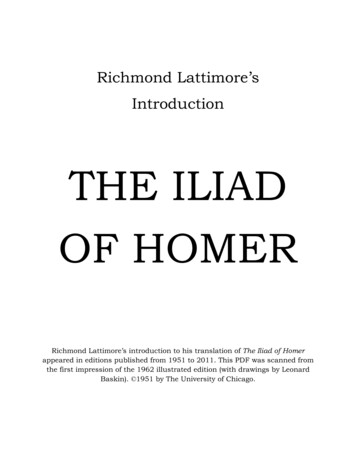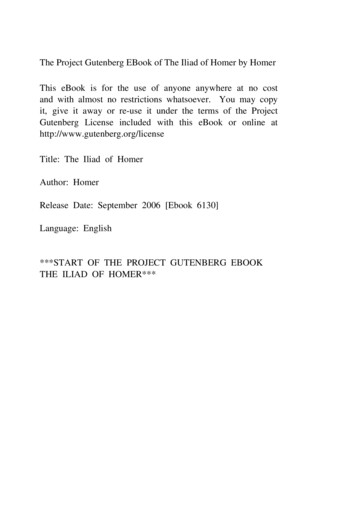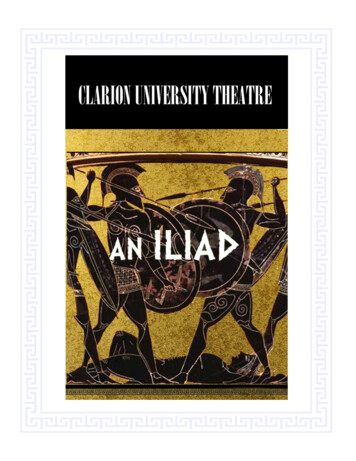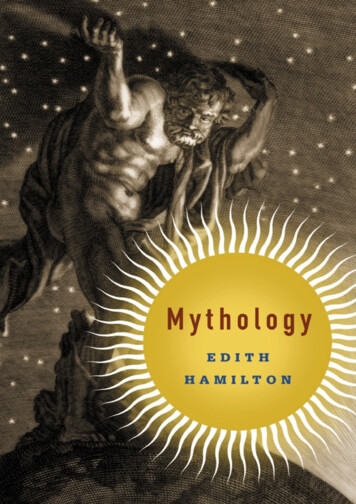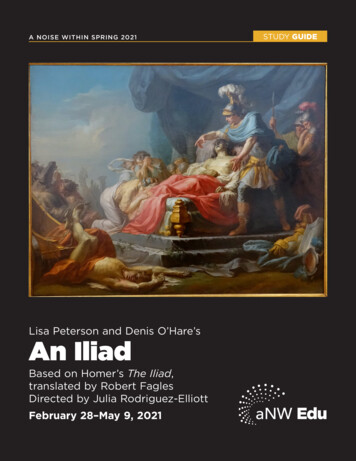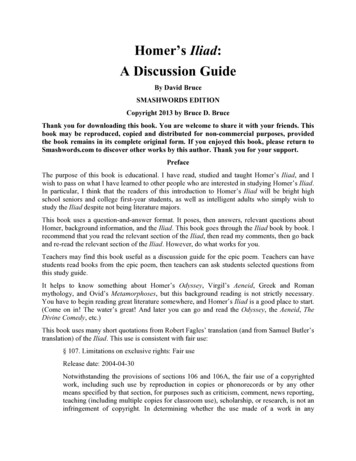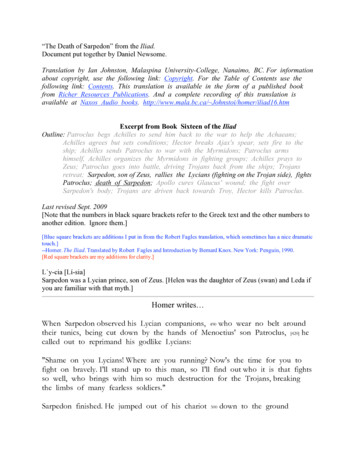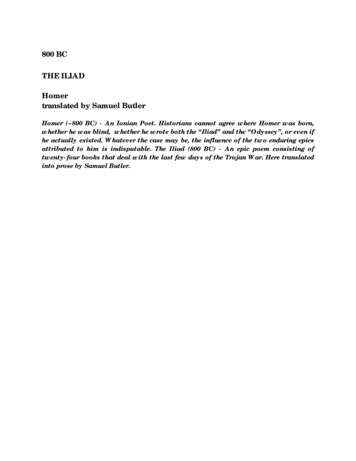
Transcription
800 BCTHE ILIADHomertranslated by Samuel ButlerHomer ( 800 BC) - An Ionian Poet. Historians cannot agree where Homer was born,whether he was blind, whether he wrote both the “Iliad” and the “Odyssey”, or even ifhe actually existed. Whatever the case may be, the influence of the two enduring epicsattributed to him is indisputable. The Iliad (800 BC) - An epic poem consisting oftwenty-four books that deal with the last few days of the Trojan War. Here translatedinto prose by Samuel Butler.
Table Of ContentsBOOK I . . . . . . . . . . . . . . .BOOK II. . . . . . . . . . . . . . . . .BOOK III . . . . . . . . . . . . . . . . .BOOK IV . . . . . . . . . . . . . . . . .BOOK V . . . . . . . . . . . . . . . . .BOOK VI . . . . . . . . . . . . . . . . .BOOK VII . . . . . . . . . . . . . . . . .BOOK VIII . . . . . . . . . . . . . . . . .BOOK IX . . . . . . . . . . . . . . . . .BOOK X . . . . . . . . . . . . . . . . .BOOK XI . . . . . . . . . . . . . . . . .BOOK XII . . . . . . . . . . . . . . . . .BOOK XIII . . . . . . . . . . . . . . . . .BOOK XIV . . . . . . . . . . . . . . . . .BOOK XV . . . . . . . . . . . . . . . . .BOOK XVI . . . . . . . . . . . . . . . . .BOOK XVII . . . . . . . . . . . . . . . .BOOK XVIII . . . . . . . . . . . . . . . .BOOK XIX . . . . . . . . . . . . . . . . .BOOK XX . . . . . . . . . . . . . . . . .BOOK XXI . . . . . . . . . . . . . . . . .BOOK XXII . . . . . . . . . . . . . . . .BOOK XXIII . . . . . . . . . . . . . . . .BOOK XXIV . . . . . . . . . . . . . . . .THE END . . . . . . . . . . . . . . . . . 96205213227238
BOOK ISing, O goddess, the anger of Achilles son of Peleus, that brought countless ills uponthe Achaeans. Many a brave soul did it send hurrying down to Hades, and many ahero did it yield a prey to dogs and vultures, for so were the counsels of Jove fulfilledfrom the day on which the son of Atreus, king of men, and great Achilles, first fell outwith one another.And which of the gods was it that set them on to quarrel? It was the son of Jove andLeto; for he was angry with the king and sent a pestilence upon the host to plague thepeople, because the son of Atreus had dishonoured Chryses his priest. Now Chryseshad come to the ships of the Achaeans to free his daughter, and had brought with him agreat ransom: moreover he bore in his hand the sceptre of Apollo wreathed with asuppliant’s wreath and he besought the Achaeans, but most of all the two sons ofAtreus, who were their chiefs.“Sons of Atreus,” he cried, “and all other Achaeans, may the gods who dwell inOlympus grant you to sack the city of Priam, and to reach your homes in safety; butfree my daughter, and accept a ransom for her, in reverence to Apollo, son of Jove.” Onthis the rest of the Achaeans with one voice were for respecting the priest and takingthe ransom that he offered; but not so Agamemnon, who spoke fiercely to him and senthim roughly away. “Old man,” said he, “let me not find you tarrying about our ships,nor yet coming hereafter. Your sceptre of the god and your wreath shall profit younothing. I will not free her. She shall grow old in my house at Argos far from her ownhome, busying herself with her loom and visiting my couch; so go, and do not provokeme or it shall be the worse for you.” The old man feared him and obeyed. Not a wordhe spoke, but went by the shore of the sounding sea and prayed apart to King Apollowhom lovely Leto had borne. “Hear me,” he cried, “O god of the silver bow, thatprotectest Chryse and holy Cilla and rulest Tenedos with thy might, hear me oh thou ofSminthe. If I have ever decked your temple with garlands, or burned your thigh-bonesin fat of bulls or goats, grant my prayer, and let your arrows avenge these my tearsupon the Danaans.” Thus did he pray, and Apollo heard his prayer. He came downfurious from the summits of Olympus, with his bow and his quiver upon his shoulder,and the arrows rattled on his back with the rage that trembled within him. He sathimself down away from the ships with a face as dark as night, and his silver bow rangdeath as he shot his arrow in the midst of them. First he smote their mules and theirhounds, but presently he aimed his shafts at the people themselves, and all day longthe pyres of the dead were burning.For nine whole days he shot his arrows among the people, but upon the tenth dayAchilles called them in assembly- moved thereto by Juno, who saw the Achaeans intheir death-throes and had compassion upon them. Then, when they were got together,he rose and spoke among them.“Son of Atreus,” said he, “I deem that we should now turn roving home if we wouldescape destruction, for we are being cut down by war and pestilence at once. Let us asksome priest or prophet, or some reader of dreams (for dreams, too, are of Jove) who can
tell us why Phoebus Apollo is so angry, and say whether it is for some vow that wehave broken, or hecatomb that we have not offered, and whether he will accept thesavour of lambs and goats without blemish, so as to take away the plague from us.”With these words he sat down, and Calchas son of Thestor, wisest of augurs, who knewthings past present and to come, rose to speak. He it was who had guided the Achaeanswith their fleet to Ilius, through the prophesyings with which Phoebus Apollo hadinspired him. With all sincerity and goodwill he addressed them thus:“Achilles, lovedof heaven, you bid me tell you about the anger of King Apollo, I will therefore do so;but consider first and swear that you will stand by me heartily in word and deed, for Iknow that I shall offend one who rules the Argives with might, to whom all theAchaeans are in subjection. A plain man cannot stand against the anger of a king, whoif he swallow his displeasure now, will yet nurse revenge till he has wreaked it.Consider, therefore, whether or no you will protect me.” And Achilles answered, “Fearnot, but speak as it is borne in upon you from heaven, for by Apollo, Calchas, to whomyou pray, and whose oracles you reveal to us, not a Danaan at our ships shall lay hishand upon you, while I yet live to look upon the face of the earth- no, not though youname Agamemnon himself, who is by far the foremost of the Achaeans.” Thereon theseer spoke boldly. “The god,” he said, “is angry neither about vow nor hecatomb, butfor his priest’s sake, whom Agamemnon has dishonoured, in that he would not free hisdaughter nor take a ransom for her; therefore has he sent these evils upon us, and willyet send others. He will not deliver the Danaans from this pestilence till Agamemnonhas restored the girl without fee or ransom to her father, and has sent a holy hecatombto Chryse. Thus we may perhaps appease him.” With these words he sat down, andAgamemnon rose in anger. His heart was black with rage, and his eyes flashed fire ashe scowled on Calchas and said, “Seer of evil, you never yet prophesied smooth thingsconcerning me, but have ever loved to foretell that which was evil. You have broughtme neither comfort nor performance; and now you come seeing among Danaans, andsaying that Apollo has plagued us because I would not take a ransom for this girl, thedaughter of Chryses. I have set my heart on keeping her in my own house, for I loveher better even than my own wife Clytemnestra, whose peer she is alike in form andfeature, in understanding and accomplishments. Still I will give her up if I must, for Iwould have the people live, not die; but you must find me a prize instead, or I aloneamong the Argives shall be without one. This is not well; for you behold, all of you,that my prize is to go elsewhither.”And Achilles answered, “Most noble son of Atreus, covetous beyond all mankind, howshall the Achaeans find you another prize? We have no common store from which totake one. Those we took from the cities have been awarded; we cannot disallow theawards that have been made already. Give this girl, therefore, to the god, and if everJove grants us to sack the city of Troy we will requite you three and fourfold.” ThenAgamemnon said, “Achilles, valiant though you be, you shall not thus outwit me. Youshall not overreach and you shall not persuade me. Are you to keep your own prize,while I sit tamely under my loss and give up the girl at your bidding? Let the Achaeansfind me a prize in fair exchange to my liking, or I will come and take your own, or thatof Ajax or of Ulysses; and he to whomsoever I may come shall rue my coming. But of
this we will take thought hereafter; for the present, let us draw a ship into the sea, andfind a crew for her expressly; let us put a hecatomb on board, and let us send Chryseisalso; further, let some chief man among us be in command, either Ajax, or Idomeneus,or yourself, son of Peleus, mighty warrior that you are, that we may offer sacrifice andappease the anger of the god.” Achilles scowled at him and answered, “You aresteeped in insolence and lust of gain. With what heart can any of the Achaeans do yourbidding, either on foray or in open fighting? I came not warring here for any ill theTrojans had done me. I have no quarrel with them. They have not raided my cattle normy horses, nor cut down my harvests on the rich plains of Phthia; for between me andthem there is a great space, both mountain and sounding sea. We have followed you,Sir Insolence! for your pleasure, not ours- to gain satisfaction from the Trojans for yourshameless self and for Menelaus. You forget this, and threaten to rob me of the prize forwhich I have toiled, and which the sons of the Achaeans have given me.Never when the Achaeans sack any rich city of the Trojans do I receive so good a prizeas you do, though it is my hands that do the better part of the fighting. When thesharing comes, your share is far the largest, and I, forsooth, must go back to my ships,take what I can get and be thankful, when my labour of fighting is done. Now,therefore, I shall go back to Phthia; it will be much better for me to return home withmy ships, for I will not stay here dishonoured to gather gold and substance for you.”And Agamemnon answered, “Fly if you will, I shall make you no prayers to stay you. Ihave others here who will do me honour, and above all Jove, the lord of counsel. Thereis no king here so hateful to me as you are, for you are ever quarrelsome and illaffected. What though you be brave? Was it not heaven that made you so? Go home,then, with your ships and comrades to lord it over the Myrmidons. I care neither foryou nor for your anger; and thus will I do: since Phoebus Apollo is taking Chryseisfrom me, I shall send her with my ship and my followers, but I shall come to your tentand take your own prize Briseis, that you may learn how much stronger I am than youare, and that another may fear to set himself up as equal or comparable with me.”The son of Peleus was furious, and his heart within his shaggy breast was dividedwhether to draw his sword, push the others aside, and kill the son of Atreus, or torestrain himself and check his anger. While he was thus in two minds, and wasdrawing his mighty sword from its scabbard, Minerva came down from heaven (forJuno had sent her in the love she bore to them both), and seized the son of Peleus by hisyellow hair, visible to him alone, for of the others no man could see her. Achilles turnedin amaze, and by the fire that flashed from her eyes at once knew that she was Minerva.“Why are you here,” said he, “daughter of aegis-bearing Jove? To see the pride ofAgamemnon, son of Atreus? Let me tell you- and it shall surely be- he shall pay for thisinsolence with his life.” And Minerva said, “I come from heaven, if you will hear me, tobid you stay your anger. Juno has sent me, who cares for both of you alike. Cease, then,this brawling, and do not draw your sword; rail at him if you will, and your railingwill not be vain, for I tell you- and it shall surely be- that you shall hereafter receivegifts three times as splendid by reason of this present insult. Hold, therefore, andobey.” “Goddess,” answered Achilles, “however angry a man may be, he must do asyou two command him. This will be best, for the gods ever hear the prayers of him
who has obeyed them.” He stayed his hand on the silver hilt of his sword, and thrust itback into the scabbard as Minerva bade him. Then she went back to Olympus amongthe other gods, and to the house of aegis-bearing Jove.But the son of Peleus again began railing at the son of Atreus, for he was still in a rage.“Wine-bibber,” he cried, “with the face of a dog and the heart of a hind, you never dareto go out with the host in fight, nor yet with our chosen men in ambuscade. You shunthis as you do death itself. You had rather go round and rob his prizes from any manwho contradicts you. You devour your people, for you are king over a feeble folk;otherwise, son of Atreus, henceforward you would insult no man. Therefore I say, andswear it with a great oath- nay, by this my sceptre which shalt sprout neither leaf norshoot, nor bud anew from the day on which it left its parent stem upon the mountainsfor the axe stripped it of leaf and bark, and now the sons of the Achaeans bear it asjudges and guardians of the decrees of heaven- so surely and solemnly do I swear thathereafter they shall look fondly for Achilles and shall not find him. In the day of yourdistress, when your men fall dying by the murderous hand of Hector, you shall notknow how to help them, and shall rend your heart with rage for the hour when youoffered insult to the bravest of the Achaeans.” With this the son of Peleus dashed hisgold-bestudded sceptre on the ground and took his seat, while the son of Atreus wasbeginning fiercely from his place upon the other side. Then uprose smooth-tonguedNestor, the facile speaker of the Pylians, and the words fell from his lips sweeter thanhoney. Two generations of men born and bred in Pylos had passed away under hisrule, and he was now reigning over the third. With all sincerity and goodwill,therefore, he addressed them thus:“Of a truth,” he said, “a great sorrow has befallen the Achaean land. Surely Priam withhis sons would rejoice, and the Trojans be glad at heart if they could hear this quarrelbetween you two, who are so excellent in fight and counsel. I am older than either ofyou; therefore be guided by me. Moreover I have been the familiar friend of men evengreater than you are, and they did not disregard my counsels. Never again can I beholdsuch men as Pirithous and Dryas shepherd of his people, or as Caeneus, Exadius,godlike Polyphemus, and Theseus son of Aegeus, peer of the immortals. These werethe mightiest men ever born upon this earth: mightiest were they, and when theyfought the fiercest tribes of mountain savages they utterly overthrew them. I came fromdistant Pylos, and went about among them, for they would have me come, and I foughtas it was in me to do.Not a man now living could withstand them, but they heard my words, and werepersuaded by them. So be it also with yourselves, for this is the more excellent way.Therefore, Agamemnon, though you be strong, take not this girl away, for the sons ofthe Achaeans have already given her to Achilles; and you, Achilles, strive not furtherwith the king, for no man who by the grace of Jove wields a sceptre has like honourwith Agamemnon. You are strong, and have a goddess for your mother; butAgamemnon is stronger than you, for he has more people under him. Son of Atreus,check your anger, I implore you; end this quarrel with Achilles, who in the day ofbattle is a tower of strength to the Achaeans.” And Agamemnon answered, “Sir, all that
you have said is true, but this fellow must needs become our lord and master: he mustbe lord of all, king of all, andcaptain of all, and this shall hardly be. Granted that the gods have made him a greatwarrior, have they also given him the right to speak with railing?” Achilles interruptedhim. “I should be a mean coward,” he cried, “were I to give in to you in all things.Order other people about, not me, for I shall obey no longer. Furthermore I say- and laymy saying to your heart- I shall fight neither you nor any man about this girl, for thosethat take were those also that gave. But of all else that is at my ship you shall carryaway nothing by force. Try, that others may see; if you do, my spear shall be reddenedwith your blood.” When they had quarrelled thus angrily, they rose, and broke up theassembly at the ships of the Achaeans. The son of Peleus went back to his tents andships with the son of Menoetius and his company, while Agamemnon drew a vesselinto the water and chose a crew of twenty oarsmen. He escorted Chryseis on board andsent moreover a hecatomb for the god. And Ulysses went as captain.These, then, went on board and sailed their ways over the sea. But the son of Atreusbade the people purify themselves; so they purified themselves and cast their filth intothe sea. Then they offered hecatombs of bulls and goats without blemish on the seashore, and the smoke with the savour of their sacrifice rose curling up towards heaven.Thus did they busy themselves throughout the host. But Agamemnon did not forget thethreat that he had made Achilles, and called his trusty messengers and squiresTalthybius and Eurybates. “Go,” said he, “to the tent of Achilles, son of Peleus; takeBriseis by the hand and bring her hither; if he will not give her I shall come with othersand take her- which will press him harder.” He charged them straightly further anddismissed them, whereon they went their way sorrowfully by the seaside, till theycame to the tents and ships of the Myrmidons. They found Achilles sitting by his tentand his ships, and ill-pleased he was when he beheld them. They stood fearfully andreverently before him, and never a word did they speak, but he knew them and said,“Welcome, heralds, messengers of gods and men; draw near; my quarrel is not withyou but with Agamemnon who has sent you for the girl Briseis. Therefore, Patroclus,bring her and give her to them, but let them be witnesses by the blessed gods, bymortal men, and by the fierceness of Agamemnon’s anger, that if ever again there beneed of me to save the people from ruin, they shall seek and they shall not find.Agamemnon is mad with rage and knows not how to look before and after that theAchaeans may fight by their ships in safety.” Patroclus did as his dear comrade hadbidden him. He brought Briseis from the tent and gave her over to the heralds, whotook her with them to the ships of the Achaeans- and the woman was loth to go. ThenAchilles went all alone by the side of the hoar sea, weeping and looking out upon theboundless waste of waters.He raised his hands in prayer to his immortal mother, “Mother,” he cried, “you boreme doomed to live but for a little season; surely Jove, who thunders from Olympus,might have made that little glorious. It is not so. Agamemnon, son of Atreus, has doneme dishonour, and has robbed me of my prize by force.”As he spoke he wept aloud, and his mother heard him where she was sitting in thedepths of the sea hard by the old man her father. Forthwith she rose as it were a grey
mist out of the waves, sat down before him as he stood weeping, caressed him with herhand, and said, “My son, why are you weeping? What is it that grieves you? Keep itnot from me, but tell me, that we may know it together.” Achilles drew a deep sigh andsaid, “You know it; why tell you what you know well already? We went to Thebe thestrong city of Eetion, sacked it, and brought hither the spoil. The sons of the Achaeansshared it duly among themselves, and chose lovely Chryseis as the meed ofAgamemnon; but Chryses, priest of Apollo, came to the ships of the Achaeans to freehis daughter, and brought with him a great ransom: moreover he bore in his hand thesceptre of Apollo, wreathed with a suppliant’s wreath, and he besought the Achaeans,but most of all the two sons of Atreus who were their chiefs.“On this the rest of the Achaeans with one voice were for respecting the priest andtaking the ransom that he offered; but not so Agamemnon, who spoke fiercely to himand sent him roughly away. So he went back in anger, and Apollo, who loved himdearly, heard his prayer. Then the god sent a deadly dart upon the Argives, and thepeople died thick on one another, for the arrows went everywhither among the widehost of the Achaeans. At last a seer in the fulness of his knowledge declared to us theoracles of Apollo, and I was myself first to say that we should appease him. Whereonthe son of Atreus rose in anger, and threatened that which he has since done. TheAchaeans are now taking the girl in a ship to Chryse, and sending gifts of sacrifice tothe god; but the heralds have just taken from my tent the daughter of Briseus, whomthe Achaeans had awarded to myself.“Help your brave son, therefore, if you are able. Go to Olympus, and if you have everdone him service in word or deed, implore the aid of Jove. Ofttimes in my father’shouse have I heard you glory in that you alone of the immortals saved the son of Saturnfrom ruin, when the others, with Juno, Neptune, and Pallas Minerva would have puthim in bonds. It was you, goddess, who delivered him by calling to Olympus thehundred-handed monster whom gods call Briareus, but men Aegaeon, for he isstronger even than his father; when therefore he took his seat all-glorious beside theson of Saturn, the other gods were afraid, and did not bind him. Go, then, to him,remind him of all this, clasp his knees, and bid him give succour to the Trojans. Let theAchaeans be hemmed in at the sterns of their ships, and perish on the sea-shore, thatthey may reap what joy they may of their king, and that Agamemnon may rue hisblindness in offering insult to the foremost of the Achaeans.” Thetis wept andanswered, “My son, woe is me that I should have borne or suckled you. Would indeedthat you had lived your span free from all sorrow at your ships, for it is all too brief;alas, that you should be at once short of life and long of sorrow above your peers: woe,therefore, was the hour in which I bore you; nevertheless I will go to the snowy heightsof Olympus, and tell this tale to Jove, if he will hear our prayer: meanwhile stay whereyou are with your ships, nurse your anger against the Achaeans, and hold aloof fromfight. For Jove went yesterday to Oceanus, to a feast among the Ethiopians, and theother gods went with him. He will return to Olympus twelve days hence; I will then goto his mansion paved with bronze and will beseech him; nor do I doubt that I shall beable to persuade him.” On this she left him, still furious at the loss of her that had beentaken from him. Meanwhile Ulysses reached Chryse with the hecatomb. When they
had come inside the harbour they furled the sails and laid them in the ship’s hold; theyslackened the forestays, lowered the mast into its place, and rowed the ship to the placewhere they would have her lie; there they cast out their mooring-stones and made fastthe hawsers. They then got out upon the sea-shore and landed the hecatomb for Apollo;Chryseis also left the ship, and Ulysses led her to the altar to deliver her into the handsof her father. “Chryses,” said he, “King Agamemnon has sent me to bring you backyour child, and to offer sacrifice to Apollo on behalf of the Danaans, that we maypropitiate the god, who has now brought sorrow upon the Argives.” So saying he gavethe girl over to her father, who received her gladly, and they ranged the holy hecatomball orderly round the altar of the god. They washed their hands and took up the barleymeal to sprinkle over the victims, while Chryses lifted up his hands and prayed aloudon their behalf. “Hear me,” he cried, “O god of the silver bow, that protectest Chryseand holy Cilla, and rulest Tenedos with thy might. Even as thou didst hear meaforetime when I prayed, and didst press hardly upon the Achaeans, so hear me yetagain, and stay this fearful pestilence from the Danaans.” Thus did he pray, and Apolloheard his prayer. When they had done praying and sprinkling the barley-meal, theydrew back the heads of the victims and killed and flayed them. They cut out the thighbones, wrapped them round in two layers of fat, set some pieces of raw meat on the topof them, and then Chryses laid them on the wood fire and poured wine over them,while the young men stood near him with five-pronged spits in their hands. When thethigh-bones were burned and they had tasted the inward meats, they cut the rest upsmall, put the pieces upon the spits, roasted them till they were done, and drew themoff: then, when they had finished their work and the feast was ready, they ate it, andevery man had his full share, so that all were satisfied. As soon as they had had enoughto eat and drink, pages filled the mixing-bowl with wine and water and handed itround, after giving every man his drink-offering.Thus all day long the young men worshipped the god with song, hymning him andchaunting the joyous paean, and the god took pleasure in their voices; but when the sunwent down, and it came on dark, they laid themselves down to sleep by the stern cablesof the ship, and when the child of morning, rosy-fingered Dawn, appeared they againset sail for the host of the Achaeans. Apollo sent them a fair wind, so they raised theirmast and hoisted their white sails aloft.As the sail bellied with the wind the ship flew through the deep blue water, and thefoam hissed against her bows as she sped onward. When they reached the widestretching host of the Achaeans, they drew the vessel ashore, high and dry upon thesands, set her strong props beneath her, and went their ways to their own tents andships.But Achilles abode at his ships and nursed his anger. He went not to the honourableassembly, and sallied not forth to fight, but gnawed at his own heart, pining for battleand the war-cry.Now after twelve days the immortal gods came back in a body to Olympus, and Joveled the way. Thetis was not unmindful of the charge her son had laid upon her, so sherose from under the sea and went through great heaven with early morning toOlympus, where she found the mighty son of Saturn sitting all alone upon its topmost
ridges. She sat herself down before him, and with her left hand seized his knees, whilewith her right she caught him under the chin, and besought him, saying“Father Jove, ifI ever did you service in word or deed among the immortals, hear my prayer, and dohonour to my son, whose life is to be cut short so early.King Agamemnon has dishonoured him by taking his prize and keeping her. Honourhim then yourself, Olympian lord of counsel, and grant victory to the Trojans, till theAchaeans give my son his due and load him with riches in requital.” Jove sat for awhile silent, and without a word, but Thetis still kept firm hold of his knees, andbesought him a second time. “Incline your head,” said she, “and promise me surely, orelse deny me- for you have nothing to fear- that I may learn how greatly you disdainme.”At this Jove was much troubled and answered, “I shall have trouble if you set mequarrelling with Juno, for she will provoke me with her taunting speeches; even nowshe is always railing at me before the other gods and accusing me of giving aid to theTrojans. Go back now, lest she should find out. I will consider the matter, and willbring it about as wish. See, I incline my head that you believe me. This is the mostsolemn that I can give to any god. I never recall my word, or deceive, or fail to do whatI say, when I have nodded my head.” As he spoke the son of Saturn bowed his darkbrows, and the ambrosial locks swayed on his immortal head, till vast Olympus reeled.When the pair had thus laid their plans, they parted- Jove to his house, while thegoddess quitted the splendour of Olympus, and plunged into the depths of the sea. Thegods rose from their seats, before the coming of their sire. Not one of them dared toremain sitting, but all stood up as he came among them. There, then, he took his seat.But Juno, when she saw him, knew that he and the old merman’s daughter, silverfooted Thetis, had been hatching mischief, so she at once began to upbraid him.“Trickster,” she cried, “which of the gods have you been taking into your counselsnow? You are always settling matters in secret behind my back, and have never yet toldme, if you could help it, one word of your intentions.” “Juno,” replied the sire of godsand men, “you must not expect to be informed of all my counsels. You are my wife, butyou would find it hard to understand them. When it is proper for you to hear, there isno one, god or man, who will be told sooner, but when I mean to keep a matter tomyself, you must not pry nor ask questions.” “Dread son of Saturn,” answered Juno,“what are you talking about? I? Pry and ask questions? Never. I let you have your ownway in everything. Still, I have a strong misgiving that the old merman’s daughterThetis has been talking you over, for she was with you and had hold of your knees thisself-same morning. I believe, therefore, that you have been promising her to give gloryto Achilles, and to kill much people at the ships of the Achaeans.” “Wife,” said Jove, “Ican do nothing but you suspect me and find it out. You will take nothing by it, for Ishall only dislike you the more, and it will go harder with you. Granted that it is as yousay; I mean to have it so; sit down and hold your tongue as I bid you for if I once beginto lay my hands about you, though all heaven were on your side it would profit younothing.” On this Juno was frightened, so she curbed her stubborn will and sat down insilence. But the heavenly beings were disquieted throughout the house of Jove, till thecunning workman Vulcan began to try and pacify his mother Juno. “It will be
intolerable,” said he, “if you two fall to wrangling and setting heaven in an uproarabout a pack of mortals. If such ill counsels are to prevail, we shall have no pleasure atour banquet
THE ILIAD Homer translated by Samuel Butler Homer ( 800 BC) - An Ionian Poet. Historians cannot agree where Homer was born, whether he was blind, whether he wrote both the “Iliad” and the “Odyssey”, or even if he actually existed. Whatever the case may be, the influence of
